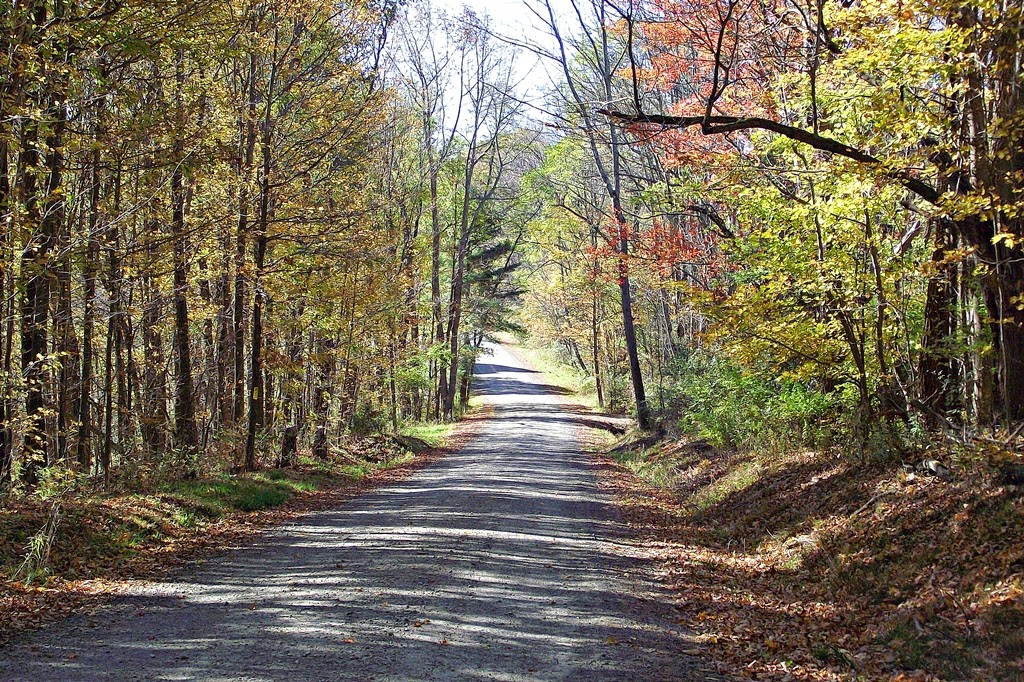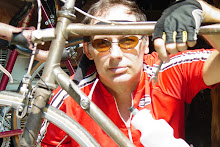Hannah and I left our pond, headed
north, slogged through mud, briars and deep wet meadow to reach the
spring and cistern; I pulled out a few buckets of silt, and we left,
veering northwest, off the property, across the road and onto Scott
Van Atta's land, through young maples and old apples, the latter
locked into a doomed struggle to keep some light, growing tall and
spindly, then curving down over to reach open space at the edge of
the meadows.
Scott died not long ago. He was
about 80 and in generally fine health. He still rode his fancy road
bike with great regularity, and in the winter he snowshoed his way up
the nearby Catskills. At some time not too long ago he had a sort of
fainting spell while riding, and went to the doctor, who after
careful examination cleared him to ride again, as they couldn't find
any specific reason to forbid it. Then he had another episode while riding and
was taken to the hospital in an ambulance; he was conscious and
joking with the rescue people, and gave them contact information; that night
he died in his sleep and could not be resuscitated.
Spring-fed cistern that feeds the pond
I've known him at a distance all my
life; he was a childhood and lifelong close friend of my mother. He
lived in a very small house on eleven acres just up the hill from my
parents, who retired to the ancestral farm in Brackney, Pennsylvania
about twenty years ago. He was a fairly introverted person,
apparently, but did show up occasionally, and was an excellent
neighbor, always willing to help my parents out. One would not call
him a hermit, as such, but his house consisted of one room, a small
enclosure holding a hot tub, a deck along the southwest edge of no
great extent, and a modest woodshed. One might call it a shack, but
it did have electricity and a wood stove, and was well-built and
insulated. Hannah and I, walking his meadow, found his long gravel
driveway and went down it to pay our respects.
On our right as we neared the house
was an area devoted to splitting large rounds of wood into firewood
chunks; on the left was the woodshed, about half full of neatly
stacked chunks. The single object leaning against the back of the
house was a high-quality bicycle pump. There was no trash, litter or
clutter of any kind. There were no windows except the entire
southwest wall: an expanse of glass facing the beautiful hills
surrounding Quaker Lake. Under the deck behind a low door I could
see, through a gap, a large gas-powered snow blower, a wheelbarrow
and a lawnmower. There was nothing resembling a lawn, though; he
must have mowed immediately around the house as it suited his
convenience. I asked Hannah if she saw any books inside; she said
no, but then said, yes, there's a stack of books apparently propping
up a piece of furniture. There was a large bird feeder on the south
side, with two heavy-duty cylinders, and it looked as if the
metal-sheathed post was smeared with axle grease to discourage those
without wings. Behind the woodshed there are eight plastic garbage cans full of rainwater.
Perhaps a decade ago my cousin and I
went to visit him at home, though I can't remember the circumstances;
he invited us in and we admired the view, and it seems in my memory
we said very little, or perhaps it was just Scott who said almost
nothing. But we were all comfortable; although the visit was a
unique occurrence, the three of us are aborigines, so to speak, of
these hills, and there was none of the normal underlying tension one
feels with the average human gathering.
So the mystery of the man himself
remains. Was he, as I might idealize him, a sort of Zen master or
simple Taoist sage, or, had he just come to resemble such a person
through some kind of convergent evolution? The subtraction of things
from a person's life can destroy the person, or teach him and change
him. He had lost his marriage; his four children had all moved away,
though as far as I knew they were not estranged; he did have a female
companion though they didn't routinely live together; he had little
money, or if he had it he did not use it on worldly goods, except his
bicycle. To me he always seemed quietly cheerful and content enough
not to have to speak of things general or specific. It's a much
overlooked, but nevertheless high achievement: to feel no anxious
pressure to chatter, to fill the silence, but rather, to inhabit the
silence comfortably – to enjoy rather than fear it.
Haiku for Scott
The bicycle pump
leans against the silent shed;
split wood is stacked high
for the winter he
will not see as it returns
to his hills this year.
The great window looks
southwest and down to the lake,
now an empty stare;
no hungry birds wait
on the empty feeding post
at the meadow's edge.
We remember him
with respect and affection;
yet hardly knew him.
Let us imagine
a phantom cyclist circling
the beautiful lake.
In another month
the maples will conjure fire
and the last blooms fly;
I will walk the woods,
harvest wild apples among















No comments:
Post a Comment